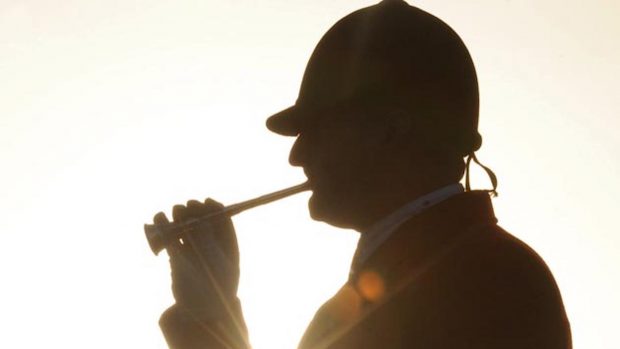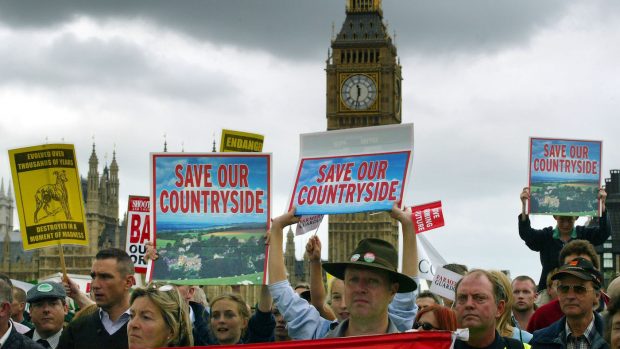“LACS has achieved nothing — they’ve had their opportunity and hunting with hounds will never, ever be banned in this country,” says Graham Sirl emphatically.
“One year on, nothing’s changed. Hunting will continue as it is until the next change in government. The Conservatives have already said they’ll bring back hunting in a free vote, and I think they will come in at the next election and we’ll be back to square one in five years’ time.”
On a frosty, sunny morning last week, Sirl arrives — for H&H photography purposes — at a meet of the New Forest foxhounds.
The last hunt he attended was five years ago, as an anti, and he is greeted with several sidelong glances — until joint-master Paul Ames comes up to greet the ex-LACS chief officer and manager of the Barronsdown deer sanctuary on Exmoor.
“I’ll shake your hand on this occasion, Mr Sirl,” says Paul.
Speaking out
In 2001, two months after an acrimonious departure from LACS, Sirl wrote a letter to the local press stating that a hunting ban would do nothing for animal welfare. In the footsteps of former LACS chief executives Richard Course and Jim Barrington, he had displayed a dramatic U-turn after years of what he describes as “boring people stupid about LACS and the campaign 24/7”.
After 22 years working against hunting, he said in his letter: “I now believe hunting with hounds plays an integral part in the management system of deer on Exmoor and the Quantocks.”
But in the five years that followed his departure, he has not once written nor spoken to the media — until now.
“I was asked by LACS not to speak to the media,” he reveals. “I’ve wanted to pick up a pen or the phone many times, but I’ve not felt the time was right. It is now, one year on from the ban.”
Back at the meet, he studies the hounds, deep in thought. He pats a hound.
“I miss watching hounds work — people probably can’t understand that I used to love watching them work on a line,” he says.
In the beginning
A former carpet salesman, Sirl saw his first hunt in 1980, and began his involvement with LACS, on a voluntary basis, shortly after.
“I’d never seen a hunt before that, despite growing up in Salisbury and then the New Forest,” he says.
That first visit grew into a hobby — days spent following local hunts, taking pictures, observing and learning about them. He started to volunteer for LACS, “distributing car stickers and things like that”, and slowly became engulfed by the organisation — which he describes as close to a “cult”.
Soon, Sirl became a regional rep, giving statements to local media, taking part in debates and giving talks — drumming up support for the crusade against field sports.
“I spent a fortune on books and now have a big library of old hunting books — we used to score a lot of points in debates,” he says. “For the first time, the hunting fraternity came up against people who had done their homework.”
Moving on
He moved to the West Country, taking up a paid position managing the LACS sanctuaries and running local operations.
“It was quite an eye-opener, seeing hunting operate down there — I could see the excitement of riding after a pack of hounds,” says Sirl, who used to ride and keep horses himself.
He renovated the businesses and employed local staff — such as the now high-profile Kevin Hill and Peter White. Then, following Jim Barrington’s well-publicised departure, he was asked by the LACS committee to take over as temporary chief officer — a role he continued for three years. During this time, he began to observe a change.
“The atmosphere in the London office was dreadful,” he says. “Staff members were tearing each other apart.”
Question time
As chief officer — a role he shared part of the time with John Bryan — Graham Sirl was involved with the Campaign to Protect Hunted Animals (CPHA), established by the International Fund for Animal Welfare (IFAW), RSPCA and LACS to co-ordinate the campaign to ban hunting. It was this, together with his involvement with the Burns Inquiry in 1999, that made him begin to question the groups’ intentions.
“I used to go to a lot of CPHA meetings — some were really strange,” he remembers. “We had lobster and prawn sandwiches at one and I remember thinking ‘Christ, if the membership could see what we’re eating and we’re discussing anti-hunt campaigns’. And we’d have meetings in places like the Liberal Club and Horseguards Hotel — it was never in the village hall down the road.”
The CPHA helped put together the Mike Foster Bill — which is precisely when the alarm bells began to ring with Graham Sirl.
“There was still a clause in the Bill allowing hounds to flush to guns — they were just doing away with one method of killing the fox, deer or hare,” he explains. “I had a meeting with Mike Foster to explain to him what flushing out meant, but he said ‘sorry, it’s too late’.
“The Bill didn’t get through, and we moved on to the next one, but flushing out was still included in that, too. I repeated my view that this was about hunting and not animal welfare, but I just upset people — I had no support from IFAW and the RSPCA.”
He adds: “It was rumoured at the time that a few clauses in the Mike Foster Bill were to keep some of the backbenchers happy who were frightened of their seats going — particularly in Wales.”
Time to go
Then, on a last cast before he had to resign from LACS, Sirl joined the Burns Inquiry team.
“I was invited to go to events such as hare coursing near Andover and hunting in the Lake District — I met wonderful people and talked to the people involved in hunting and learnt a lot,” he recalls. “I remember going to a meet of the Duke of Beaufort’s, where I was made very welcome. But I always remember feeling Kevin Hill’s camera lens on me — he was working for IFAW at the time and tried to make it look like I was going over to the other side. But I did my job and filed my report.”
In reality, Sirl was changing his opinion. He felt LACS had lost direction — “strayed away from animal protection” — and staff and volunteers turned against him.
After the Burns Inquiry, he resigned from LACS after a company lawyer pointed the finger at him for distributing letters over inappropriate use of funds.
“To this day I defend myself. I was never allowed to see the solicitor’s report, nor defend myself against it,” he says, going on to describe the sour feeling he has towards the organisation that forced him out.
Achieving a balance
“I despise the people who put the Hunting Bill forward, I despise those organisations [LACS, RSPCA and IFAW] that threw money at that campaign for an end that was absolutely zero. As far as I’m concerned, I wasted 20 years. They had the opportunity, it was given to them on a plate and they blew it.”
Five years on, Graham Sirl is back in the New Forest, running two antique shops with his partner, as well as a private hire business.
“I think hunting offers a balance in the countryside — if I could see it being done effectively as a management tool, I’d be happy,” he says. “I was a Labour party member until five years ago, but I lost faith.
“There’s a rebellion going on about some of the bills it’s pushed through, and hunting is the one that broke the camel’s back.”
- Read former LACS PR campaigner Miles Cooper’s views on hunting >>
- Don’t miss the first Horse & Hound shows special, which reviews life one year after the hunting ban, as well as being packed with great features and the first part of Horse & Hound’s ultimate show directory

SUBSCRIBE TO HORSE & HOUND AND SAVEEnjoy all the latest equestrian news and competition reports delivered straight to your door every week.To subscribe for just £1.43 a copy click here >>




